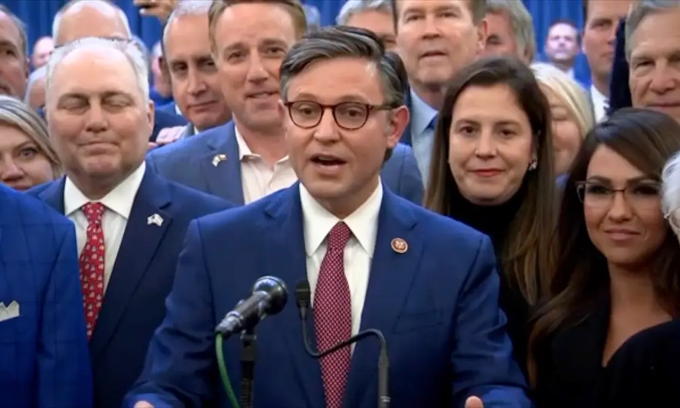House Republicans aim to pass three bills this week, and President Joe Biden has already threatened to veto two of them.
That may not concern House Speaker Mike Johnson (R-La.), who has said he wants to pass conservative spending bills to increase his negotiating advantage with the Democrat-controlled Senate and White House.
The three bills come in the middle of a battle between Democrats and Republicans—and even among Republicans—about how much to cut federal spending in 2024.
Here’s a look at the speaker’s strategy, the crux of the debate, and a top-line summary of the bills themselves.
Negotiating From Strength
Democrats control both the Senate and the White House, and Republicans have a very small majority in the House. To even the odds, Mr. Johnson wants to pass all 12 spending bills through the House before the Senate completes its work so he can negotiate “from a position of strength.”
The speaker outlined that strategy to GOP members in an Oct. 23 letter, just before he was elected to the post.
The House has passed five of the 12 spending bills so far, which account for well over 70 percent of nondiscretionary spending. The Senate has passed none.
By passing bills in the House with significant spending cuts, Mr. Johnson hopes to force the Senate to accept at least part of the House’s spending plan.
The threat of a presidential veto is irrelevant at this point because Mr. Johnson appears to view these bills as his starting offer in negotiations.
But Democrats are unlikely to accept the House’s demands without a fight because they believe they already made a deal on spending levels for 2024.
The Real Problem
The House passed a conservative spending package back in April, which was an effort to get President Biden to negotiate over the debt ceiling. That bill was the Limit, Save, Grow Act, and it set spending levels at the 2022 level and limited spending growth to 1 percent a year.
As a negotiating tactic, it worked. President Biden and then-Speaker Kevin McCarthy (R-Calif.) worked out a deal to raise the U.S. debt limit temporarily in exchange for spending cuts.
However, the administration wouldn’t agree to the cuts outlined in the Limit, Save, Grow Act. Instead, the two sides agreed on slight reductions to nondefense discretionary spending with modest increases in defense spending in 2024. They also capped spending growth at 1 percent for 2025.
With that, Democrats considered negotiations over the total amount of 2024 spending to be a done deal.
“This negotiation resulted in the Fiscal Responsibility Act (FRA) of 2023, which passed with overwhelming bipartisan support and set spending levels for [fiscal years] 2024 and 2025,” the White House said in an Oct. 30 statement, calling further negotiations a waste of time.
Republicans, especially the fiscal hawks, see the FRA as an upper limit on spending, not a lower limit. Many of them still want to enact the lower spending levels of the Limit, Save, Grow Act. Democrats, meanwhile, are claiming that a deal is a deal.
But the dollar amounts are only part of the problem. Democrats also complain that the cuts target key parts of President Biden’s agenda: green energy; diversity, equity, and inclusion programs; and support for low-income families.
Here’s a high-level summary of the three bills on tap for this week.
Transportation
The Transportation spending bill also covers Housing and Urban Development and related agencies. This $90.24 billion legislation comes in $8.63 billion (9 percent) below what President Biden had asked for.
The actual cost to taxpayers is just $65.21 billion, according to the Appropriations Committee’s fact sheet, because more than $25 billion of the total will be paid for by cutting proposed spending on new IRS agents over the next 10 years.
The bill slashes $8.35 billion from transportation grant programs and reduces spending on everything from hiring air-traffic controllers to removal of lead-based paint from homes.
Democrats aren’t happy about this bill because they say it’ll make life less safe and affordable for working Americans.
“This bill would cripple our economy and eliminate thousands of jobs,” Rep. Rosa DeLauro (D-Conn.), ranking member on the Appropriations Committee, said in a July statement. “It does nothing to address the historic lack of affordable housing, and makes our vulnerable populations less safe.”
The Office of Management and Budget issued a statement saying the bill would gut planned infrastructure improvements and undo the administration’s plans to reduce greenhouse gasses.
If there’s a hitch here for Republicans, it’s that the spending contained in this bill is actually $2.9 billion higher than in 2023. That’s because new funding was needed to offset lower-than-expected income from government housing and the effect of inflation on people receiving housing assistance.
It’s worth noting that last week, Rep. Ken Buck (R-Colo.) voted against the Energy and Water spending bill because it didn’t cut enough spending. His spokesperson told The Epoch Times, “Congressman Buck voted no because he wanted the … bill to remain at 2019 spending levels.”
The Energy and Water bill passed anyway, but Mr. Johnson can’t afford too many no-votes by Republicans this week.
The Interior
The Department of the Interior spending bill also covers the environment and related agencies. This $34.8 billion legislation is 10 percent less than last year.
The bill also takes back $9.4 billion in funding provided to the Environmental Protection Agency (EPA) and related entities that was allocated by the Inflation Reduction Act (IRA).
That makes the actual price tag for taxpayers about $25.4 billion, which is less than the amount for 2018.
Other than the Payments in Lieu of Taxes program and funding for Tribes and Wildland Management, the bill cuts funding for nearly every other program. EPA funding is reduced by nearly $4 billion, or 39 percent of total funding.
The administration’s memo listed a host of objections to this bill. The gist is that it would endanger the health of Americans by failing to protect the environment.
“These damaging cuts would drastically diminish the agency’s ability to protect the air we breathe, the water we drink, the public lands we cherish, and the natural resources we count on, risking the health of millions of Americans,” the statement said.
“The cuts in this bill are so severe that even agencies that usually garner bipartisan support are targeted for damaging reductions,” Rep. Chellie Pingree (D-Maine) said when the bill was considered in committee in July.
She cited the National Park Service as an example, which is targeted for a 13 percent cut. “Do we really want parks with overflowing trash and dirty bathrooms? Trails that are unsafe because there isn’t staff capacity to keep them maintained?” she asked.
Legislative Branch
The Legislative Branch spending bill includes Congress, the Capitol police, the Library of Congress, the Congressional Budget Office, and other agencies that support the work of Congress.
This $6.74 billion legislation is a 2 percent reduction from last year’s total. Funding for the Capitol police increased $46 million to $781 million. Most agencies and programs remained about the same.
This is the least controversial of the three bills. However, Democrats objected to some of the proposed cuts.
Rep. Adriano Espaillat (D-N.Y.) said the bill “keeps the lights on” for Congress and its supporting agencies, but he lamented that it did not do more to make the Capitol campus secure and inclusive.
“This bill, just as with the other 12 Appropriations Bills, contains provisions that eliminate diversity, equity and inclusion programs, and allow for discrimination towards the LGBTQI plus community,” Mr. Espaillat said. “The Republicans are obsessed with cutting federal funds and eliminating programs that help to grow and diversify our country.”
The House is expected to take up these bills through regular order on Nov. 1. That means plenty of debate on the House floor and the opportunity to offer amendments. With all members present and voting, 217 of 221 Republican votes would be required to pass each one.



















These Self-proclaimed Constitutionalist Conservative representatives in both the House and the Senate need to band together and declare that inflation is every bit an Unconstitutional Tax on THE PEOPLE as the ones they pass through Congress, with the Biden Administration proving his “unvoted for” inflation to be more damaging to the American economy and the national security as any mindless approved $10,000 military aircraft toilet. Congress and Congress alone has been CONSTITUTIONALLY granted the power of the purse and not any unelected people of the Federal Reserve or pudding head President. NOTHING will be solved until this power to Inflationarilly tax THE PEOPLE is returned to Congress and taken back from criminally acting power stealing Presidents, who through bankrupting Presidential edicts and policies are destined only to be Supreme Court reversed long after the destruction occurs. We are talking Trillions of dollars strapped in debt to the backs of honest working taxpayers in corrupted money socially redistributed not just to the American life failures unable or unwilling to SELF-govern their own lives, but now under Biden/Obama have given away in Fed printed money, Masses of lost financial strength to the world’s lost losers in misdirected inflated oil revenues, stolen strategic oil reserves now having to be replaced in inflated prices that only make our enemies richer and our working people of creation poorer, oppressed, and financially crippled.
They should, but WILL THEY is the key question.
Rosa DeLauro knows all about killing jobs and crippling the economy…she’s REAL good at it!
House Speaker Mike Johnson (R-La.) now get a bill going on ending or reducing Foreign Aid along with cutting aid to the UN democratic UKRAINE!
HELL< cut aid to the UN itself!